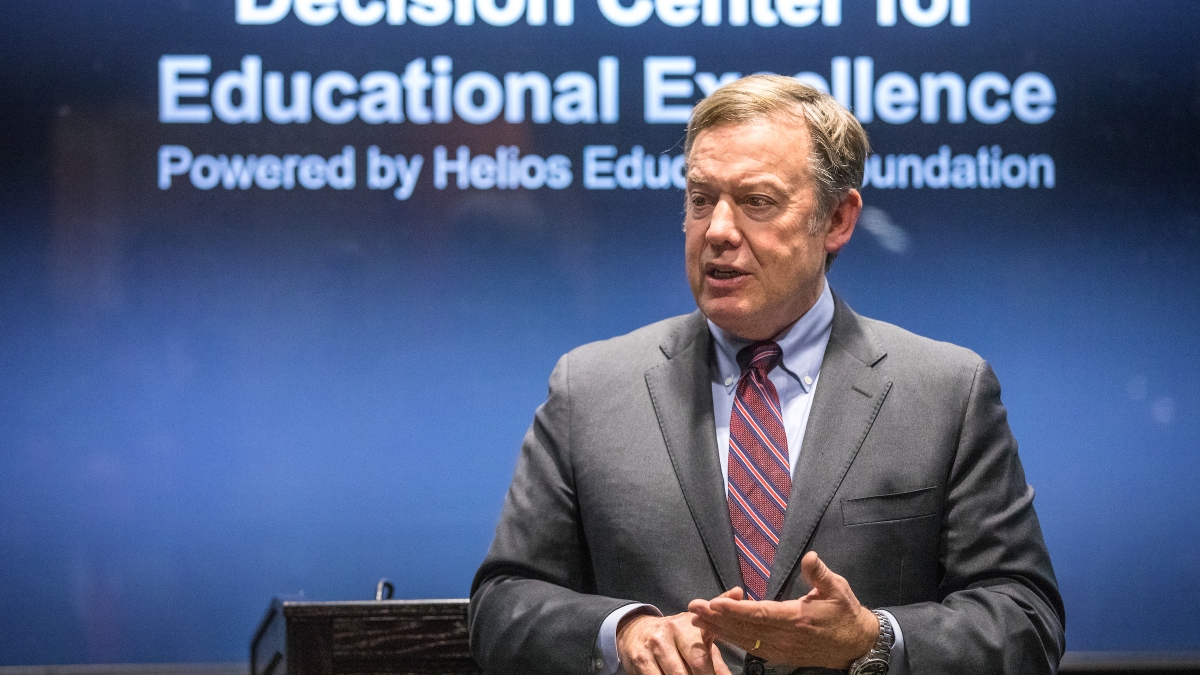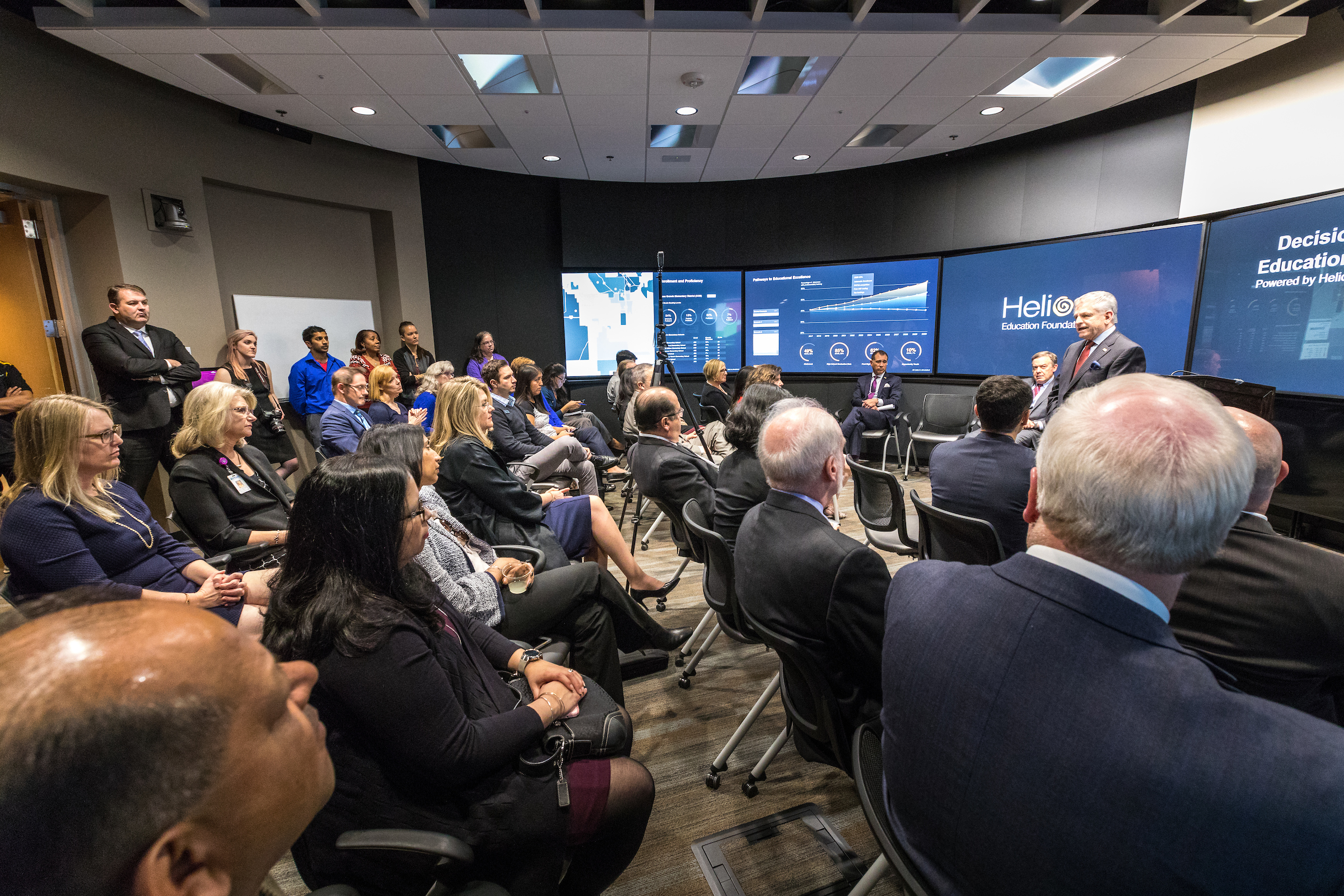Arizona State University and the Helios Education Foundation announced on Thursday a historic partnership that will serve as a nexus for facilitating education research and practice in the state.
In the drum of Tempe’s Decision Theater, ASU President Michael Crow and Vince Roig, founding chairman of Helios Education Foundation, announced the creation of the Decision Center for Educational Excellence, Powered by Helios Education Foundation.
“ASU is proud to be joining with Helios Education Foundation on a partnership to tackle the serious challenges within Arizona’s education system,” Crow said. “We will pool our energy, our values and our ideas to create a tool that will allow people in school districts, community colleges and universities to make better decisions about how we prepare students for the next economy.”
Together, ASU and Helios will develop a first-of-its-kind computational model of Arizona’s pre-K through post-secondary education system, which will provide real-time feedback on how policies, practices, new innovations and other interventions would affect the state’s complex education system.
“There is no reason Arizona can’t be the highest achieving educational attainment state in the nation,” Crow said. “The only thing that keeps us from that is, do we work hard enough, do we innovate fast enough and do we use every possible tool we have at our disposal.”
The model will allow stakeholders to identify bright spots in the state’s education system that may be scalable system-wide. It will also help to identify interventions that could serve to improve performance in underperforming schools. Arizona currently ranks amongst the lowest in the nation for teacher pay, student-teacher ratio and spending per student.
“I have often said that everyone is entitled to their own opinions, but none of us are entitled to our own facts,” Roig said. “It is our sincere hope that this project will bring a new level of data analysis and sophistication to our state’s efforts to improve education outcomes for all students.”
Vince Roig, founding chairman of the board of Helios Education Foundation, speaks at the announcement of the Decision Center for Educational Excellence, Powered by Helios Education Foundation on Thursday in Tempe. Photo by Charlie Leight/ASU Now
The partnership will leverage ASU’s strengths in computational modeling, complex systems and innovation with Helios’ commitment to student success. The model will offer Arizona’s decision-makers, from school leaders to policymakers, the tools needed to make informed, effective, data-driven decisions that support a high-quality education for all Arizona students.
“Our state has set a postsecondary degree attainment goal, and many of us in this room are involved in developing strategies to help us reach that goal,” Roig said. “We have named our collective effort Achieve60AZAchieve60AZ is a coalition of more than 60 community, business, philanthropic and education organizations in Arizona whose goal is to generate greater awareness of the importance of increasing Arizona’s level of educational attainment while building support to improve college entry and completion; boost adult education and training; and fuel a pipeline of competitive talent for Arizona’s employers., and the work that will be done here — at the Decision Theater — will help us realize that goal.”
The Decision Center for Educational Excellence is being funded by a three-year, $2.5 million grant from the Helios Education Foundation and will be showcased out of the Decision Theater in downtown Tempe. The Decision Theater Network actively engages researchers and leaders to visualize solutions to complex problems using the latest computing and display technologies for data visualization, modeling and simulation.
Top photo: ASU President Michael Crow speaks at the announcement of the Decision Center for Educational Excellence, Powered by Helios Education Foundation on Thursday. Photo by Charlie Leight/ASU Now
More Arts, humanities and education

ASU instructor’s debut novel becomes a bestseller on Amazon
Desiree Prieto Groft’s newly released novel "Girl, Unemployed" focuses on women and work — a subject close to Groft’s heart.“I have always been obsessed with women and jobs,” said Groft, a writing…

‘It all started at ASU’: Football player, theater alum makes the big screen
For filmmaker Ben Fritz, everything is about connection, relationships and overcoming expectations. “It’s about seeing people beyond how they see themselves,” he said. “When you create a space…

Lost languages mean lost cultures
By Alyssa Arns and Kristen LaRue-SandlerWhat if your language disappeared?Over the span of human existence, civilizations have come and gone. For many, the absence of written records means we know…



